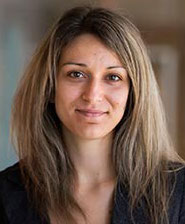Spring ’20 Joint CSC@USC/CommNetS-MHI Seminar Series
 |
Dimitra Panagou,
University of Michigan
|
Abstract
Planning and control for multi-agent systems has been a popular topic of research, with applications in numerous real-world autonomous systems. Despite significant progress over the years, challenges such as constraints (in terms of state and time specifications), malicious or faulty information, environmental uncertainty and scalability are still open. In this talk, I will present some of our recent results and ongoing work on a Prescribed-Time Control Barrier Functions framework, where the barriers and underlying controllers meet state and time constraints. The framework builds upon the notions of finite-time and fixed-time stability and redefines the standard control barrier functions to enable control synthesis that meets spatiotemporal specifications. The efficacy of the approach is illustrated via a spatiotemporal motion planning scenario.
Biosketch
Dimitra Panagou received the Diploma and PhD degrees in Mechanical Engineering from the National Technical University of Athens, Greece, in 2006 and 2012, respectively. Since September 2014 she has been an Assistant Professor with the Department of Aerospace Engineering, University of Michigan. Prior to joining the University of Michigan, she was a postdoctoral research associate with the Coordinated Science Laboratory, University of Illinois, Urbana-Champaign (2012-2014), a visiting research scholar with the GRASP Lab, University of Pennsylvania (June 2013, fall 2010) and a visiting research scholar with the University of Delaware, Mechanical Engineering Department (spring 2009). Dr. Panagou's research program emphasizes in the exploration, development, and implementation of control and estimation methods in order to address real-world problems via provably correct solutions. Her research spans the areas of nonlinear systems and control; multi-agent systems and networks; motion and path planning; human-robot interaction; navigation, guidance, and control of aerospace vehicles. She is particularly interested in the development of provably correct methods for the safe and secure (resilient) operation of autonomous systems in complex missions, with applications in robot/sensor networks and multi-vehicle systems (ground, marine, aerial, space). Dr. Panagou is a recipient of a NASA Early Career Faculty Award, of an AFOSR Young Investigator Award, and a Senior Member of the IEEE and the AIAA.
